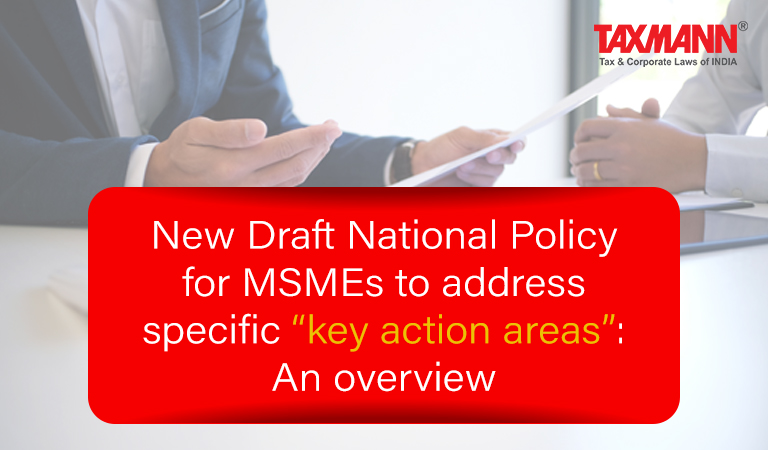New Draft National Policy for MSMEs to address specific “key action areas”: An overview
- Blog|News|Company Law|
- 2 Min Read
- By Taxmann
- |
- Last Updated on 18 February, 2022

By Editorial Team
Ministry of MSME has released the draft National Policy for MSMEs in India and has recommended “specific action areas” to ensure the sector’s speedy growth. The action areas include Intergovernmental Roles & Responsibility, Legislation and Regulatory Framework for MSMEs in India, Access to Finance/Financial Assistance for MSMEs, Technology Upgradation/ Adaptation, Skill Development, Knowledge Management, Ease of Doing Business, Development of MSME Code and Exit Code.
1. Introduction
In recent years, the government of India has taken several steps to strengthen the MSME sector in recent years such as (i) Introduction of MUDRA Bank with over USD dollar 50 billion disbursements (ii) Launching of an online portal for facilitating payment under SAMADHAN and web-based MSME data bank (iii) 50% fee reduction (iv) financial support for ZERO DEFECT ZERO EFFECT (ZED) manufacturing etc. other measures include Access to easy finance, particularly during CORONA Pandemic, Competitive SME policy themes, digitalization support for SMEs, Skill development of SMEs and lot more.
Despite several actions/initiatives taken in the past, there was no specific policy focusing on the development of MSMEs with a vision to steer and shape the future course of the MSME segment in India. Now, the Ministry of MSME has released the draft National Policy for MSMEs (‘Draft Policy’) in India wherein it has recommended “specific action areas” to ensure the sector’s speedy growth of the sector. India did not have an MSME policy to date. This write-up aims to provide an overview of the new draft policy.
2. Why is policy needed?
As several measures were taken by the government to strengthen the MSME sector. Recent actions have tried to address many of them through notifications from time to time and follow-up actions. Yet, there is a need to systematically look into these issues to form a dynamic policy by GoI to take actions and promote follow-up at the state level to address specific barriers in the growth of MSMEs. These barriers include:
(a) Complex Legislative and regulatory framework for MSMEs
(b) Inadequate Facilitation Council in majority states
(c) Limited scope of facilitation Council as redress cases of MSEs only
(d) Lesser supply of electricity & skilled labour.
(e) Despite numerous credit schemes, MSMEs still face problems in accessing finance.
(f) Lack of convergence and synergy among various stakeholders to enhance MSME productivity
(g) Non-friendly dispute resolution mechanism
(h) No MSME code to provide SOPs
Apart from the aforementioned barriers, there are a few other barriers also like Business environment for ease of doing business and exit code needs to strengthen, need to work more on the education system to address the challenges of skilled youths employed in these industries, etc.
The purpose of the policy is to bring together a comprehensive framework of strategies and actions for suitable adaptation and inclusion in the state-level policies. The document needs wider dissemination, debate, and feedback from stakeholders to firm up a national policy for follow-up at the intergovernmental level.
Click Here To Read The Complete Article
Disclaimer: The content/information published on the website is only for general information of the user and shall not be construed as legal advice. While the Taxmann has exercised reasonable efforts to ensure the veracity of information/content published, Taxmann shall be under no liability in any manner whatsoever for incorrect information, if any.

Taxmann Publications has a dedicated in-house Research & Editorial Team. This team consists of a team of Chartered Accountants, Company Secretaries, and Lawyers. This team works under the guidance and supervision of editor-in-chief Mr Rakesh Bhargava.
The Research and Editorial Team is responsible for developing reliable and accurate content for the readers. The team follows the six-sigma approach to achieve the benchmark of zero error in its publications and research platforms. The team ensures that the following publication guidelines are thoroughly followed while developing the content:
- The statutory material is obtained only from the authorized and reliable sources
- All the latest developments in the judicial and legislative fields are covered
- Prepare the analytical write-ups on current, controversial, and important issues to help the readers to understand the concept and its implications
- Every content published by Taxmann is complete, accurate and lucid
- All evidence-based statements are supported with proper reference to Section, Circular No., Notification No. or citations
- The golden rules of grammar, style and consistency are thoroughly followed
- Font and size that’s easy to read and remain consistent across all imprint and digital publications are applied



 CA | CS | CMA
CA | CS | CMA
